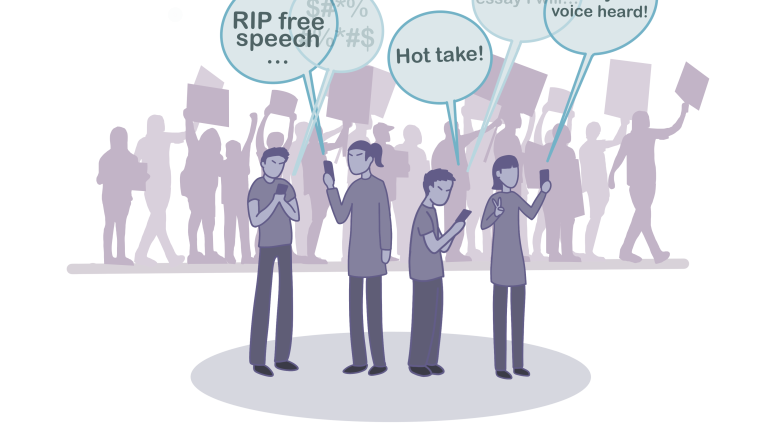From my first introduction to political satire as a child in Mad Magazine and This Hour has 22 Minutes, political and social commentary have always been among my main interests. I steer conversation toward politics — often to the dismay of whatever poor soul I’m talking to — and I am no stranger to a good rant on social media.
Recently, however, I’ve been feeling burnt out and disinterested. Friends try to engage me in discussion on the latest political news and I don’t have much left to say.
I’m disappointed with the current state of politics. It has been difficult for a leftie like me to watch so many left-wing causes rise up, brimming with hope, and then crash and burn over the years.
Tom Mulcair’s New Democratic Party snatched defeat from the jaws of victory in the 2015 federal election, followed by the uninspiring Trudeau 2.0 years.
Then there was the spectacular collapse of U.S. senator Bernie Sanders’s 2020 campaign to earn the presidential nomination for the Democratic party amid the sudden onset of the COVID-19 pandemic.
We’ve got Wab Kinew here at home, but he has come into power on the heels of Brian Pallister’s and Heather Stefanson’s scorched-earth approach to provincial budgeting, and there’s lots of rebuilding to do.
For the most part, the left’s fortunes over the past decade have been “close, but no cigar.”
All the while, dire issues like climate change and income inequality continue to worsen, with governments not doing enough to address them.
On a more fundamental level, though, I am disillusioned with the discourse about politics. Social media makes it easier than ever to share our opinions. Everyone is raising awareness and we’re drowning in hot takes at the expense of real political engagement.
Consider social media call-outs.
I want to avoid the typical “cancel culture run amok” narrative here, so let’s start by saying many, if not most, of these call-outs are perfectly understandable. People don’t get to just avoid criticism for bigotry and intolerance under the flimsy guise of “free speech.” No one is undermining free speech by posting online.
The energy people put into online disputes would be more useful elsewhere. Monitoring the opinions of individuals rather than tackling the underlying systemic issues that create them seems inefficient. I don’t have anything against social media call-outs, they’re just not actually politics.
It’s not only the influence of social media, however. The annoying free speech absolutists who hysterically think Twitter hordes — I refuse to acknowledge the existence of X — are the harbingers of George Orwell’s dystopia in 1984 are the same people who overemphasize the importance of ideas.
There is a tendency among this crowd to glorify the supposed power of ideas and to hold up freedom of speech as the highest ideal, more sacred and important than any other right, and the basis for all other rights.
This liberal obsession with the importance of the discourse, or so-called “marketplace of ideas,” is based on a belief in the fundamental rationality of human beings and a vision of politics as a civilized parlour game of debate and compromise, rather than a power struggle with real human costs.
Freedom of speech is a fundamental right, but it is not the primary influence on political change. Action is. I am not saying people shouldn’t talk about politics. When it comes to political discussion versus actual political work and activism, many people can walk and chew gum. It’s just important to know the difference between the two and recognize that talk is cheap.
I am not exempt from this criticism. I’ve had to come to grips with the fact that my opinions about politics have next to no impact, which is why I don’t talk about politics quite as obsessively anymore. There are other things in life worth talking about.
This has all been very abstract, so let’s provide a concrete example. For years, people have fretted about the number of people that are skeptical of climate change. Those numbers aren’t as high as they sometimes seem, however. A 2023 Leger poll showed that 72 per cent of Canadians are worried about climate change. Yet in 2020, the Canadian government was still providing at least $4.8 billion in fossil fuel subsidies every year. Public opinion does not necessarily translate to public policy.
The difference between a reaction and an action is clear when it comes to climate change, though. An active example is the pipeline blockades of the Wet’suwet’en. According to a 2021 report from the Indigenous Environmental Network, direct action from the First Nation’s chiefs and supporters is working to block the emission of 125 million tons of greenhouse gases.
The report found that Indigenous people’s resistance to a variety of North American fossil fuel projects over the previous 10 years had prevented or delayed nearly 1.6 billion tons — or 24 per cent — of annual emissions in Canada and the U.S.
Is this enough to stem the tide of climate change? No, but 24 per cent of emissions in two major countries is not nothing. We don’t need to raise awareness at this point. So many people are painfully aware of the problems facing us. Let the people who disagree complain while small groups of dedicated people put in the work to create change through direct action. You don’t always have to convince everyone to make an impact.
While the right course of action might not be obvious, we can be confident that actually trying something concrete will accomplish a lot more than sitting around talking about it.


